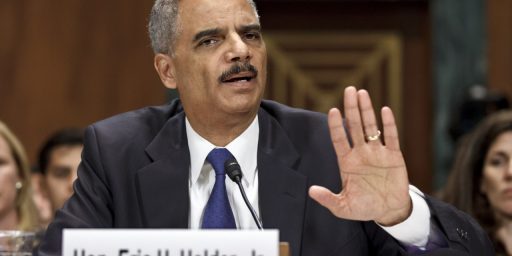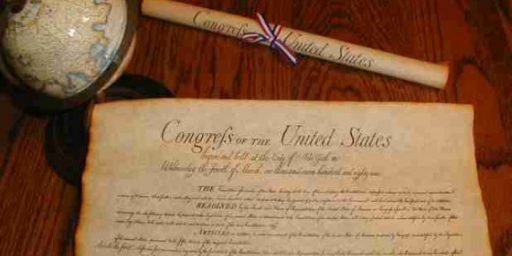Good News For Supporters Of Journalist Shield Laws
Two news items yesterday advanced in some small measure the protection of journalists from having to reveal sources under Court Order.
Last year, I wrote about a Fox News reporter who had gotten caught up in the criminal trial of accused Aurora, CO movie theater shooter James Holmes when she reported that she had been told by police investigators that Holmes had mailed a notebook filled with violent imagrey to a psychiatrist immediately prior to the shootings. Holmes’s attorneys had sought to force the reporter, Jana Winter, to reveal the identity of the source of the information she received, but Holmes refused to do so and was backed up in her decision by journalists and free press advocates from all over the political spectrum. Yesterday, the Supreme Court refused to accept an appeal from Holmes’s attorneys of a decision that ruled that she was not required to testify:
WASHINGTON (AP) — The Supreme Court has turned away an effort to force a television news reporter to reveal her sources for a story about the suspect in the mass shooting that left 12 people dead in a suburban Denver movie theater in 2012.
The justices did not comment Tuesday in leaving in place a decision by New York’s top appellate court that shielded Fox News reporter Jana Winter from being called to testify in a Colorado court. Winter is based in New York.
Generally, this seems like the right decision. However, it strikes me that Winter was lucky that the matter proceeded through the courts in New York, which has a very strong journalist’s shield law. Had this gone forward in Colorado, the outcome may have been quite different.
In somewhat related news, Attorney General Eric Holder suggested that the Justice Department may not pursue efforts to get a New York Times reporter to reveal his sources in a report about intelligence operations:
WASHINGTON — Attorney General Eric H. Holder Jr. hinted Tuesday that the Justice Department might choose not to jail a New York Times reporter for defying a subpoena forcing him to discuss his confidential sources — even as the Obama administration continues to pursue the right to do so before the Supreme Court.
Mr. Holder made the suggestion in a meeting on Tuesday with a group of journalists he convened to discuss press-freedom issues after an uproar last year over investigative tactics in leak cases. During the discussion, Mr. Holder was asked about the subpoena to the reporter, James Risen, that requires him to testify in the trial of Jeffrey Sterling, a former Central Intelligence Agency official. Prosecutors say Mr. Sterling was a source for a chapter in “State of War,” the book Mr. Risen published in 2006.
No representative from The New York Times attended the meeting. But according to one participant, Mr. Holder said, and an aide allowed to be put on the record, the following: “As long as I’m attorney general, no reporter who is doing his job is going to go to jail. As long as I’m attorney general, someone who is doing their job is not going to get prosecuted.”
A Justice Department statement describing the meeting said that Mr. Holder was not discussing any particular case.
“The industry representatives also questioned the department about cases in which federal prosecutors are seeking testimony from journalists regarding sources,” it said. “The department officials declined to discuss any particular cases, but reiterated the attorney general’s longtime assertion that, as long as he is in office, no journalist will be prosecuted or go to prison for performing ordinary news gathering activities.”
Mr. Holder has made similar comments in the past, including in testimony to Congress after a court filing in another leak case came to light last May. It portrayed a Fox News reporter, James Rosen, as a criminal conspirator who had aided and abetted a State Department contractor’s leak of classified information about North Korea.
The Justice Department said it never intended to indict Mr. Rosen, and the next month, Mr. Holder told the Senate, “The department has not prosecuted, and as long as I have the privilege of serving as attorney general of the United States will not prosecute, any reporter for doing his or her job.”
The statement on Tuesday went further because it encompassed imprisoning reporters, not just prosecuting them. Mr. Risen has vowed to go to prison for contempt rather than comply with the subpoena.
The Sterling case centers on a chapter in Mr. Risen’s book about Operation Merlin, a Clinton-era effort by the C.I.A. to sabotage Iranian nuclear research by sending a Russian scientist to sell flawed blueprints to Iran. After charging Mr. Sterling with leaking restricted information to Mr. Risen, prosecutors issued a subpoena requiring Mr. Risen to testify at the trial.
A Federal District Court judge largely quashed the subpoena in 2011, ruling that Mr. Risen was protected by a limited “reporter’s privilege” if the government’s need for the information was outweighed by the public interest in protecting news gathering.
The Justice Department appealed. In a 2-to-1 decision last year, an appeals court ruled that no “reporter’s privilege” exists and so Mr. Risen was required to testify. He appealed to the Supreme Court, but the department urged the justices to let the appellate ruling stand.
So far, the Supreme Court has not decided to either accept or reject the case. One hopes that they accept it, because it has been more than forty years now since the Court last ruled on the issue of whether or not the First Amendment includes any kind of testimonial privilege for journalists. In that case, Branzburg v. Hayes, the Court ruled that no such privilege exists under the Constitution in a 5-4 decision. There have been many developments in First Amendment law since then, though, and nearly every state in the country now has a shield law of its own. One of the few places in the United States without such a protection for reporters is in the Federal Courts. If the Court were to find that at least some form of limited privilege exists, or that the government must demonstrate some substantial need for the information before a reporter will be compelled to reveal sources, then that would be a good development.
I’ve been skeptical of the idea of journalist shield laws in the past, and I remain so, but both these news items strikes me as a positive developments.







While both are positive developments, they continue to be problematic because they are still focused on *journalists* versus *acts of journalism.*
This means that being a “professional” journalist (whatever that means) is most likely critical to getting protections.
The question still remains where bloggers and others fit into these laws. For example there’s no guarantee that if Doug, James or anyone else here at OTB were to “break” a story involving sensitive information, that we would have access to any of these protections if the law was to come a knocking.
Holder no doubt intends to cover NYT “journalists”, but I doubt his mind would stretch to cover OTB “journalists”. And even for the NYT, the protection rests on an individuals intentions, not law.
@Matt Bernius:
It largely depends on the state you’re in. In several states, judges have started adopting a broader definition of what is covered by the privilege to cover non-traditional forms of media. This is especially true in New York State from what I’ve gathered.
@Doug Mataconis:
Totally right. That said many states hedges take a very fun view of such activities.
On the plus side the US is still ahead of many countries in this regard.